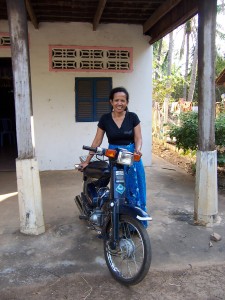BASIS/AMA Hosts Workshop on Gender and Assets in Washington D.C.
Understanding how men’s and women’s access to, control over, and ownership of a range of productive assets (e.g., land and other property, credit, and improved agricultural inputs) has the potential to help donors and development practitioners improve strategies for supporting gender-specific pathways out of poverty. On October 13, 2011, the BASIS/AMA CRSP sponsored an outreach workshop in Washington, D.C. on reducing the gender gap in assets. The meeting brought together leading researchers to share their results from studies across the globe to identify the critical links between asset accumulation, gender, and poverty reduction.
Agnes Quisumbing and Ruth Meinzen-Dick, both Senior Research Fellows at IFPRI, are leading cutting-edge research on this subject under both the BASIS/AMA CRSP work and related research supported under the “Gender, Agriculture and Assets Project” (GAAP) funded by the Bill and Melinda Gates Foundation. During this workshop, Agnes Quisumbing reported the findings from the BASIS/AMA CRSP-supported research in Bangladesh and Uganda on men’s and women’s asset accumulation and implications for social protection. Ruth Meinzen-Dick provided an overview of the conceptual framework guiding the GAAP activities, illustrating that men and women not only control, own, or dispose of assets in different ways, but also access, control, and own different kinds of assets.
Concurrently with these efforts, Cheryl Doss (Yale University) and Carmen Diana Deere (University of Florida) presented findings from their study, “In Her Name: Measuring the Gender Asset Gap in Ecuador, Ghana, and India,” a collaborative effort with the Centre of Public Policy (CPP) at the Indian Institute of Management Bangalore (IIMB), University of Ghana, American University, Yale University, University of Florida, and the Latin American Faculty of Social Sciences (FLACSO), Ecuador. Preliminary findings from a similar study conducted in Uganda were presented by Goretti Nabanoga of Makerere University. The day concluded with a presentation and discussion led by Caren Grown, Senior Gender Advisor at USAID, on improving the measurement of USAID’s Feed the Future Initiative programs to reduce gender inequalities. In collaboration with IFPRI and the Oxford Poverty and Human Development Initiative, USAID has developed the Women’s Empowerment in Agriculture Index to establish a baseline measure of women’s control over critical aspects of their lives and livelihoods as well as to assess change in five domains of empowerment among women and in the relative parity between women and men.
The findings revealed at the workshop support the renewed attention given by USAID and other donors to the intersection of agriculture productivity gains and improvements in gender equality. The research is critical in development strategies to reduce the gender asset gap. To view presentations from the event, click here.
More information can be found on the BASIS/AMA CRSP on the CRSP’s website; on GAAP and on Feed the Future priorities. The Women’s Empowerment in Agriculture Index is available here.

